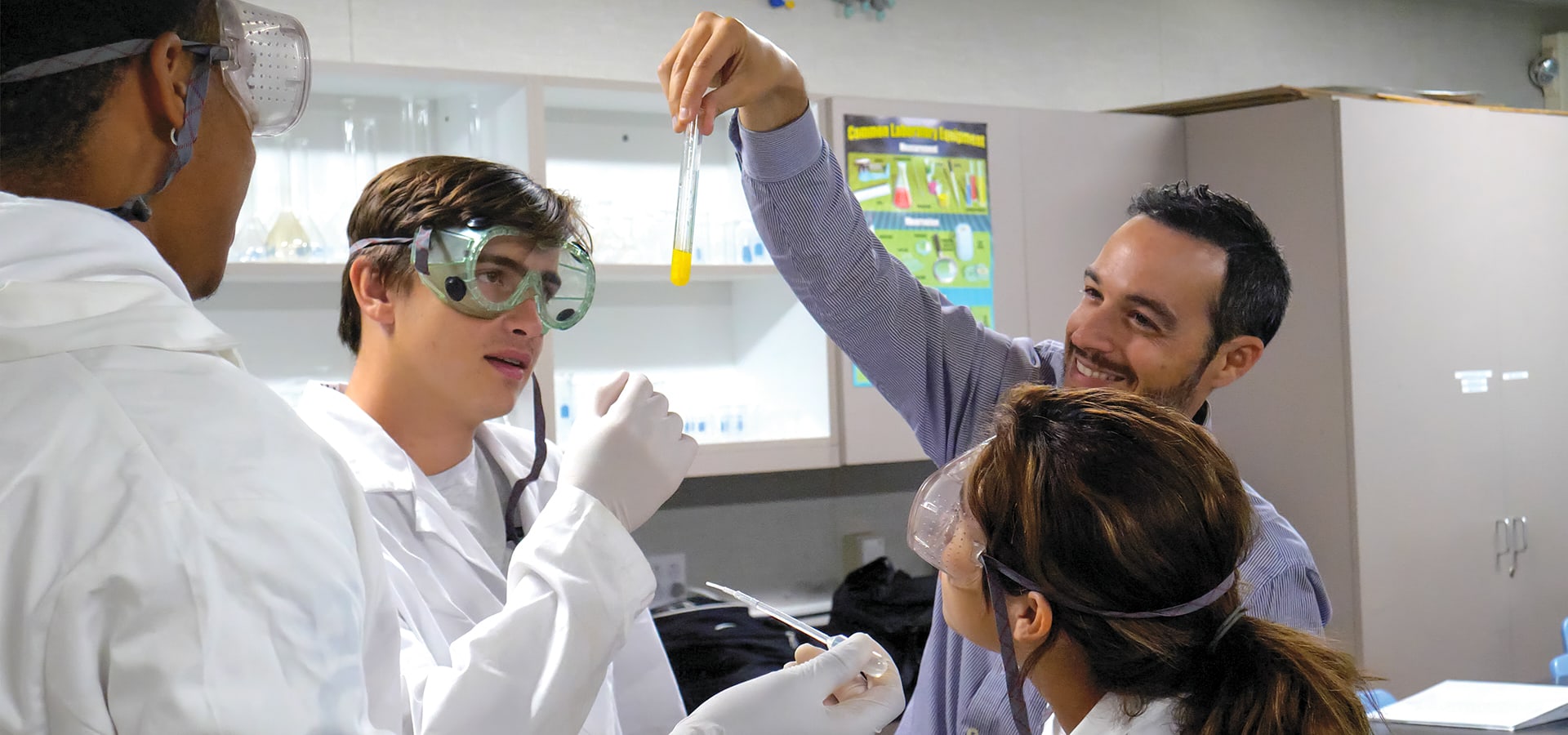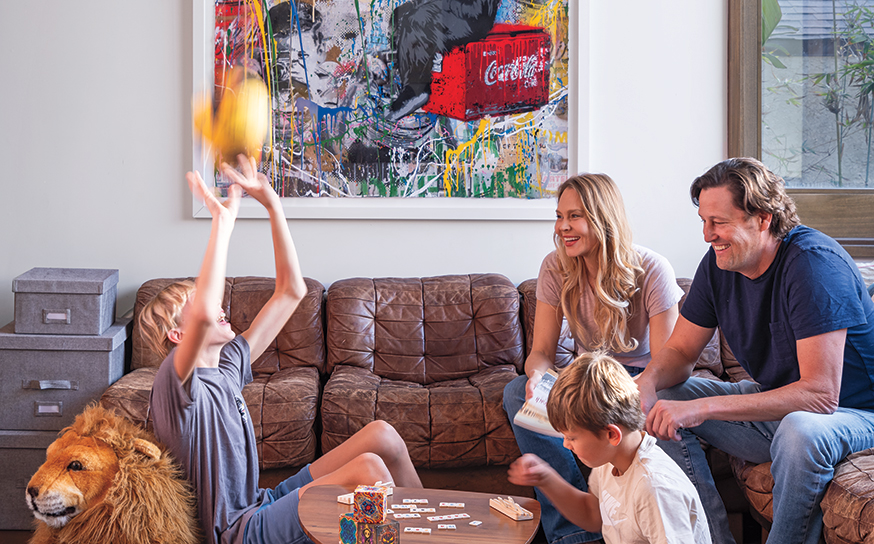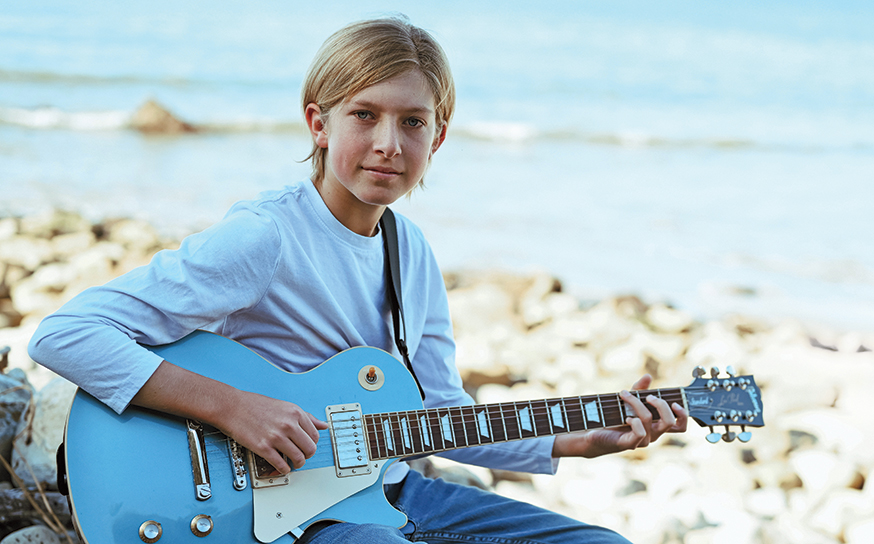The Total Package
Blending academic offerings and an integrated advisory program with co-curricular activities and community service, a local school helps prepare students for college and beyond.
- CategoryPeople
- AboveRHP basketball team competing at the CIF regional championships
Academic, personal and professional success have long been the focus of parents seeking transformative educational experiences, but many often struggle to understand how those outcomes are achieved. Rolling Hills Preparatory School (RHP), a college preparatory school in San Pedro serving grades 6–12, has always embraced the dynamic nature of education and continues to improve on a formula that encourages student success through a challenging but supportive individualized curriculum that is constantly adapting to the needs of its student body.

Above: Performing an in-class chemistry experiment
A Balanced Approach
A foundational aspect of RHP is its Four Pillars of student-oriented education that guide institutional decision-making and encourage students to be thoughtful and accomplished global citizens. The Four Pillars are Disciplined Minds, Sound Character, Healthy Bodies and Creative Spirits. One of the secrets to Rolling Hills Prep’s approach to education is the need for balance, including a rigorous academic curriculum, robust social-emotional support networks and numerous co-curricular offerings that allow students to develop their sense of identity and agency.
“Rolling Hills Prep has long identified academic rigor as a core component of education.”
Rolling Hills Prep has long identified academic rigor as a core component of education. However, the school’s definition of “rigor” recognizes the importance of challenging students’ strengths and providing support or new learning approaches in areas where students may struggle. A deeply integrated advisory program ensures that every student is matched with a faculty mentor who goes above and beyond to ensure positive outcomes by identifying key academic or co-curricular opportunities and addressing learning or social difficulties quickly.
Each year, these faculty advisors come together to assess student performance, course requirements and course placement and build the following year’s curriculum from the ground up, referencing opportunities and needs of every RHP student throughout the process. In some cases, this leads to large shifts in course offerings and structure—making student success an institutional priority with curriculum, staffing and allocation of resources.
Journaling during an outdoor education trip
The Academic Program
Beginning in middle school, RHP students are met with a dynamic learning environment that focuses heavily on the transition out of elementary school and builds the groundwork for skills and understanding that are crucial for success in high school and beyond. Recently, RHP became a candidate for the International Baccalaureate Middle Years Program, which reinforces an already progressive approach to education with inquiry-based learning that encourages cross-curricular collaboration, such as a science project that ties in with topics learned in social studies courses. Numerous social-emotional support programs, such as professional counselors and a high school-led peer mentoring program, exist to nurture interpersonal development, prevent stress, celebrate diversity and confront bullying before it begins.
High school students are met with an academic program that promotes the development of individual agency and incorporates college counseling directly into the curriculum to ensure that students are informed and prepared for life after RHP. Students who wish to highlight excellence in specific subjects can apply for one of three specialized diplomas in the arts, math and sciences, or history and world languages—requiring these students to demonstrate a commitment to their fields of focus beyond the standard curricular requirements.
Students are encouraged to embrace “Sound Character” by giving back to the community in the form of community service learning, and many students go even further in conjunction with service groups, athletic teams or the National Honor Society. Other nonacademic traditions and opportunities encourage students to develop “soft skills” that can be crucial to future success, such as requiring every graduating senior to develop their public speaking abilities and address the student body on a topic of their choice.
Above: Performing Hello, Dolly! at the Warner Grand Theatre in San Pedro
Developing Passions
In addition to academic offerings, students of all grade levels are provided with numerous opportunities to explore and develop their interests in co-curricular activities with no-cut policies. Middle school students are encouraged to explore their creative side with rotating arts courses that give them an introduction to visual and performing arts, and the high school curriculum builds on that with advanced offerings in drawing and painting, 3-D art, darkroom and digital photography, design, music and composition, and theatre studies. There are also several annual opportunities for students to highlight their creative endeavors, such as the fall play, spring musical, classical night, visual art shows and recurring talent shows.
No-cut policies extend into athletics in both middle and high school teams, including high-performing basketball teams that have won regional and state championships in recent years and have featured top-ranked players, such as Clarice Akunwafo, class of ’21, who is ranked as the #2 center in varsity girls’ basketball nationwide and was recruited in her junior year to play for USC. Students interested in STEM have opportunities to build problem-solving robots on the robotics team, imagine the future of municipal planning with a “Future Cities” team, and have several opportunities to present projects and research at the annual STEM Expo.
Performing in an all-school talent show
Looking Ahead
Even in the time of COVID-19, the school has succeeded at fostering positive virtual learning experiences and is prepared to address learning impact upon a full return to campus. In the coming years, the school anticipates helping new students navigate subjects and skills that may have been impacted by unsuccessful experiences with virtual learning at other schools. To increase accessibility and address the financial impact of COVID-19, RHP has also committed to freezing or lowering tuition for its programs and offerings.
The school accepts applications year-round on a rolling basis. More admission information, including recordings of virtual admission events, can be found at RollingHillsPrep.org/visit.









